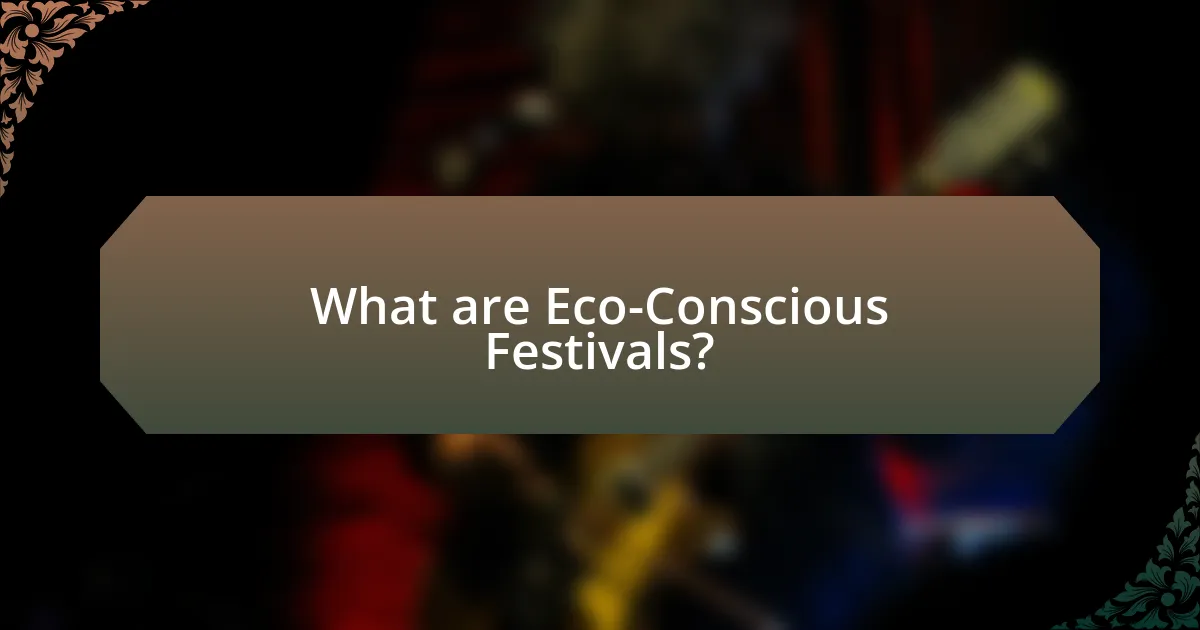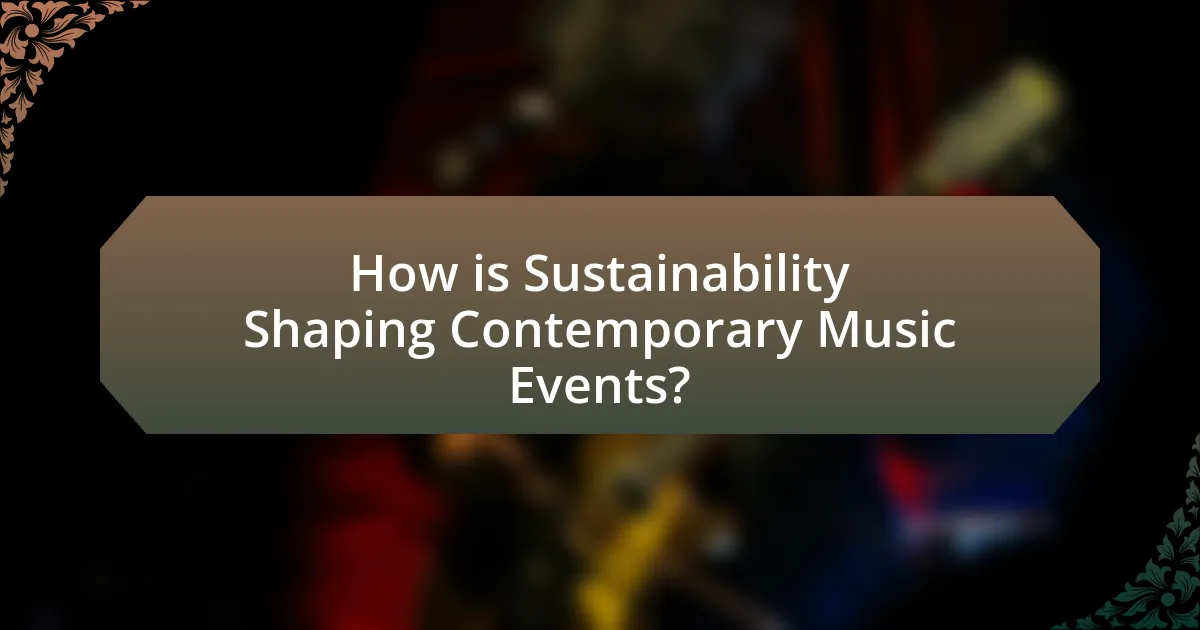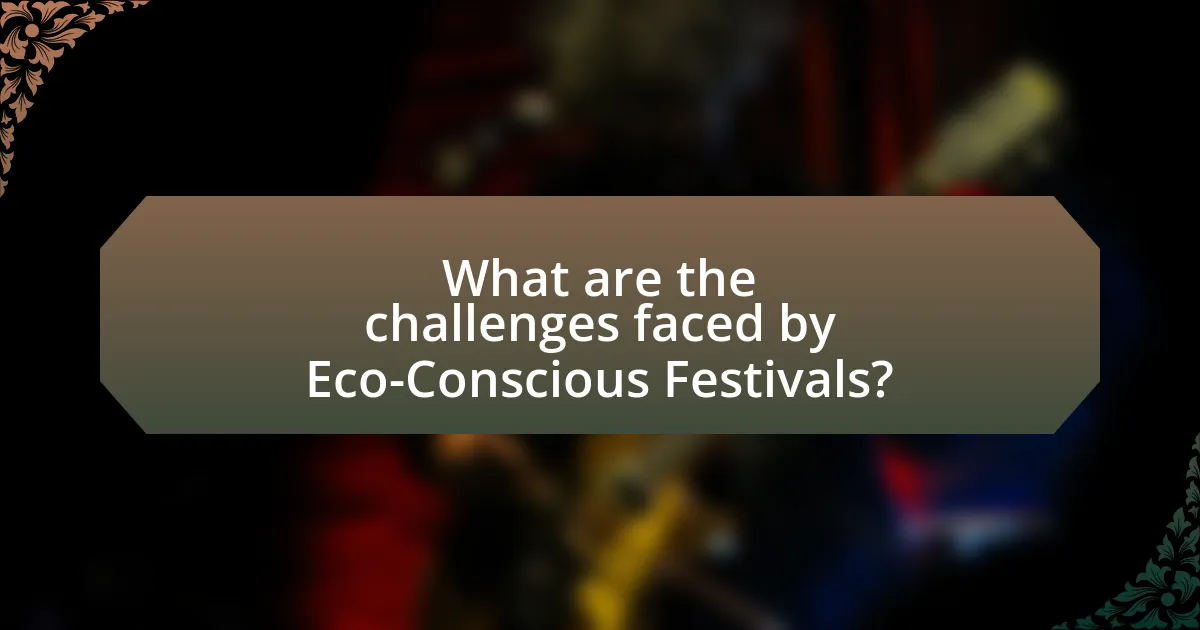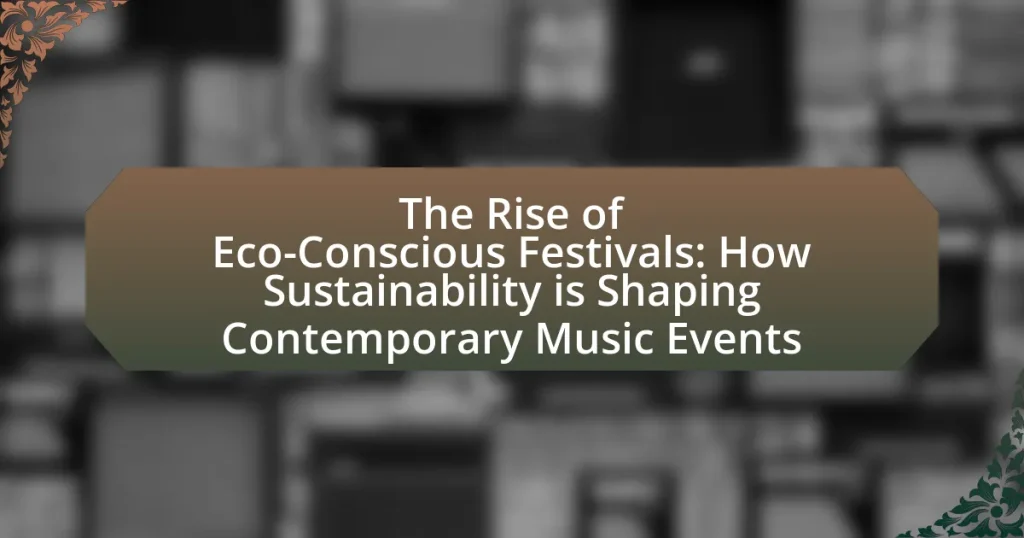Eco-conscious festivals are events designed to minimize environmental impact while promoting sustainability and ecological awareness. These festivals implement practices such as waste reduction, recycling, renewable energy use, and local sourcing of food and materials, distinguishing them from traditional music festivals. The article explores the motivations behind the rise of eco-conscious festivals, the influence of climate change on organizers’ decisions, and the role of attendees in promoting sustainability. It also discusses the challenges faced by these festivals, including financial constraints and logistical complexities, while highlighting future trends and best practices for enhancing eco-conscious efforts in the music event industry.

What are Eco-Conscious Festivals?
Eco-conscious festivals are events designed to minimize environmental impact while promoting sustainability and awareness of ecological issues. These festivals implement practices such as waste reduction, recycling, use of renewable energy, and sourcing local food and materials to create a more sustainable experience for attendees. For instance, events like the Glastonbury Festival have adopted measures to reduce plastic waste and promote green initiatives, demonstrating a commitment to environmental stewardship.
How do Eco-Conscious Festivals differ from traditional music festivals?
Eco-Conscious Festivals prioritize sustainability and environmental responsibility, distinguishing them from traditional music festivals that often overlook these aspects. Eco-Conscious Festivals implement practices such as waste reduction, renewable energy use, and local sourcing of food and materials, aiming to minimize their ecological footprint. For example, events like the Glastonbury Festival have adopted measures to reduce plastic waste and promote recycling, while traditional festivals may still rely heavily on single-use plastics and non-sustainable practices. This commitment to environmental stewardship reflects a growing trend in the music industry towards more sustainable event management, aligning with broader societal shifts towards eco-friendliness.
What practices define an Eco-Conscious Festival?
Eco-conscious festivals are defined by practices that prioritize sustainability and environmental responsibility. These practices include waste reduction through recycling and composting, the use of renewable energy sources, sustainable transportation options for attendees, and sourcing local and organic food vendors. For instance, festivals like Glastonbury have implemented extensive recycling programs, achieving a 50% waste diversion rate, while others, such as Coachella, have invested in solar energy to power stages. Additionally, eco-conscious festivals often promote educational initiatives about environmental issues, further engaging attendees in sustainability efforts.
Why is the concept of eco-consciousness important in the festival scene?
The concept of eco-consciousness is important in the festival scene because it addresses the environmental impact of large gatherings and promotes sustainable practices. Festivals generate significant waste, with studies indicating that a single event can produce thousands of tons of trash, including plastic and food waste. By adopting eco-conscious practices, such as waste reduction, recycling, and the use of renewable energy sources, festivals can minimize their ecological footprint. Furthermore, eco-consciousness resonates with attendees, as a 2021 survey found that 70% of festival-goers prefer events that prioritize sustainability, indicating a shift in consumer preferences towards environmentally responsible experiences. This alignment not only enhances the festival’s reputation but also contributes to broader environmental goals, making eco-consciousness a vital aspect of contemporary music events.
What are the key motivations behind the rise of Eco-Conscious Festivals?
The key motivations behind the rise of Eco-Conscious Festivals include increasing public awareness of environmental issues, a demand for sustainable practices, and the desire for community engagement. Public awareness has surged due to climate change discussions, leading festival organizers to adopt eco-friendly measures to attract environmentally conscious attendees. Additionally, consumers increasingly prefer brands and events that prioritize sustainability, prompting festivals to implement practices such as waste reduction, renewable energy use, and local sourcing. Community engagement is also a significant factor, as these festivals often foster a sense of collective responsibility and action towards environmental stewardship, enhancing the overall experience for attendees.
How does climate change influence festival organizers’ decisions?
Climate change significantly influences festival organizers’ decisions by prompting them to adopt more sustainable practices. As extreme weather events become more frequent, organizers are increasingly considering climate resilience in their planning, such as selecting venues less prone to flooding or heatwaves. Additionally, many festivals are now prioritizing eco-friendly materials, waste reduction strategies, and carbon offset initiatives to align with the growing public demand for sustainability. For instance, a 2021 report by the International Music Summit highlighted that 70% of festival organizers are implementing sustainability measures in response to climate concerns, demonstrating a clear shift towards eco-conscious decision-making in the industry.
What role do attendees play in promoting sustainability at festivals?
Attendees play a crucial role in promoting sustainability at festivals by actively participating in eco-friendly practices and influencing the overall environmental impact of the event. Their choices, such as using public transportation, reducing waste through recycling and composting, and opting for sustainable food options, directly contribute to minimizing the festival’s carbon footprint. For instance, a study by the University of California found that festivals that encouraged attendees to use reusable containers and provided adequate recycling facilities saw a 30% reduction in waste generated. Additionally, attendees can advocate for sustainability by supporting vendors that prioritize eco-friendly products and by engaging in discussions about environmental issues, thereby fostering a culture of sustainability within the festival community.

How is Sustainability Shaping Contemporary Music Events?
Sustainability is significantly shaping contemporary music events by driving the adoption of eco-friendly practices and reducing environmental impact. Many festivals now prioritize renewable energy sources, such as solar and wind power, to minimize carbon footprints; for instance, the Coachella Valley Music and Arts Festival has implemented solar power solutions to support its energy needs. Additionally, organizers are increasingly focusing on waste reduction through initiatives like composting and recycling, with events like Glastonbury Festival aiming for zero waste by 2025. Furthermore, sustainable transportation options, such as bike parking and public transit incentives, are being promoted to decrease emissions associated with travel to events. These practices not only reflect a growing awareness of environmental issues among attendees but also align with the values of a younger, eco-conscious audience, thereby influencing the overall design and execution of music festivals today.
What sustainable practices are being implemented at music festivals?
Music festivals are implementing various sustainable practices, including waste reduction, renewable energy use, and eco-friendly transportation options. Many festivals have adopted comprehensive recycling and composting programs to minimize landfill waste, with some achieving over 90% waste diversion rates. Additionally, festivals are increasingly utilizing solar panels and wind turbines to power stages and facilities, significantly reducing their carbon footprint. Furthermore, organizers are promoting public transportation, carpooling, and bike-sharing initiatives to decrease vehicle emissions associated with festival attendance. These practices reflect a growing commitment to environmental stewardship within the music festival industry.
How do waste management strategies impact festival sustainability?
Waste management strategies significantly enhance festival sustainability by minimizing environmental impact and promoting resource efficiency. Effective waste management practices, such as recycling, composting, and reducing single-use plastics, lead to lower landfill contributions and decreased carbon footprints. For instance, festivals that implement comprehensive recycling programs can divert up to 70% of waste from landfills, as evidenced by the 2019 Glastonbury Festival, which achieved a 50% reduction in waste through such initiatives. Additionally, sustainable waste management fosters a culture of environmental responsibility among attendees, encouraging them to adopt eco-friendly behaviors beyond the festival.
What innovations in energy use are being adopted by festivals?
Festivals are adopting several innovations in energy use, including solar power, energy-efficient lighting, and battery storage systems. Solar power installations allow festivals to harness renewable energy, significantly reducing reliance on fossil fuels; for instance, Coachella has implemented solar panels to power stages and facilities. Energy-efficient lighting, such as LED technology, minimizes electricity consumption while enhancing visual experiences. Additionally, battery storage systems enable festivals to store excess energy generated during peak sunlight hours for use during nighttime events, optimizing energy management. These innovations collectively contribute to a more sustainable festival environment, aligning with the growing trend of eco-consciousness in the music industry.
Why are partnerships with eco-friendly brands important for festivals?
Partnerships with eco-friendly brands are important for festivals because they enhance sustainability efforts and improve the overall environmental impact of the event. By collaborating with these brands, festivals can implement practices such as waste reduction, renewable energy use, and sustainable sourcing of materials, which align with the growing consumer demand for eco-conscious experiences. Research indicates that 70% of festival-goers prefer events that prioritize sustainability, demonstrating that eco-friendly partnerships can attract more attendees and foster a positive brand image.
How do sponsorships from sustainable companies enhance festival credibility?
Sponsorships from sustainable companies enhance festival credibility by aligning the event with environmentally responsible practices and values. When festivals partner with recognized sustainable brands, they signal a commitment to eco-friendly initiatives, which can attract a more conscientious audience. Research indicates that 66% of consumers are willing to pay more for sustainable brands, demonstrating that such sponsorships can positively influence public perception and attendance. Additionally, festivals that showcase sustainable sponsors often implement green practices, such as waste reduction and renewable energy use, further solidifying their reputation as credible and responsible events.
What benefits do festivals gain from collaborating with environmental organizations?
Festivals gain enhanced sustainability practices and improved public perception by collaborating with environmental organizations. This partnership allows festivals to implement eco-friendly initiatives, such as waste reduction, carbon offsetting, and sustainable sourcing, which can significantly lower their environmental impact. For instance, festivals that have partnered with organizations like the Green Music Initiative have reported a 30% reduction in waste through better recycling and composting efforts. Additionally, collaboration with environmental groups can attract a more eco-conscious audience, leading to increased ticket sales and sponsorship opportunities, as consumers increasingly prefer brands that demonstrate social responsibility.

What are the challenges faced by Eco-Conscious Festivals?
Eco-conscious festivals face several challenges, including high costs, logistical complexities, and participant engagement. The implementation of sustainable practices often requires significant financial investment, which can strain budgets; for instance, eco-friendly materials and waste management systems can be more expensive than traditional options. Additionally, organizing these festivals involves intricate logistics, such as sourcing local and sustainable vendors, which can complicate planning and execution. Engaging attendees in sustainable practices, like reducing waste and using public transport, also presents a challenge, as it requires effective communication and behavioral change strategies to ensure participation.
How do financial constraints affect the implementation of sustainable practices?
Financial constraints significantly hinder the implementation of sustainable practices in eco-conscious festivals. Limited budgets restrict organizers’ ability to invest in environmentally friendly technologies, materials, and services, which are often more expensive than conventional options. For instance, a study by the University of California found that festivals with tighter budgets are less likely to adopt renewable energy sources or waste reduction initiatives, as these require upfront capital that may not be available. Consequently, financial limitations can lead to a reliance on cheaper, less sustainable alternatives, undermining the overall goal of promoting eco-friendly practices in the music event industry.
What are the logistical challenges of sourcing sustainable materials?
Sourcing sustainable materials presents several logistical challenges, including limited availability, higher costs, and complex supply chains. Limited availability arises because sustainable materials often come from specific regions or require particular growing conditions, making them less accessible than conventional materials. Higher costs are associated with sustainable sourcing due to the increased labor and production standards needed to meet eco-friendly certifications. Complex supply chains complicate logistics further, as they may involve multiple stakeholders, including farmers, manufacturers, and distributors, each requiring coordination to ensure that materials are sourced ethically and sustainably. These challenges can hinder the timely procurement of materials necessary for eco-conscious festivals, impacting overall event planning and execution.
How do festivals measure the success of their sustainability efforts?
Festivals measure the success of their sustainability efforts through various metrics, including waste reduction, carbon footprint analysis, and participant feedback. For instance, many festivals conduct waste audits to quantify the amount of waste diverted from landfills, aiming for specific diversion rates, such as 75% or higher. Additionally, they often calculate their carbon emissions using tools like the Greenhouse Gas Protocol, allowing them to set reduction targets and track progress over time. Surveys and feedback from attendees also provide qualitative data on perceptions of sustainability initiatives, helping festivals assess their impact and areas for improvement. These methods collectively offer a comprehensive view of a festival’s sustainability performance.
What are the future trends for Eco-Conscious Festivals?
Future trends for eco-conscious festivals include increased use of renewable energy sources, zero-waste initiatives, and enhanced community engagement. Festivals are increasingly adopting solar and wind energy to power their events, reducing reliance on fossil fuels. For instance, major festivals like Coachella and Glastonbury have implemented solar panels and energy-efficient systems, showcasing a commitment to sustainability. Additionally, zero-waste initiatives are becoming standard, with many festivals aiming to divert 90% or more of their waste from landfills through recycling and composting programs. Community engagement is also on the rise, as festivals collaborate with local organizations to promote environmental awareness and support local economies. These trends reflect a broader cultural shift towards sustainability in the events industry, driven by consumer demand for environmentally responsible practices.
How might technology further enhance sustainability in music events?
Technology can enhance sustainability in music events by enabling efficient resource management and reducing waste. For instance, digital ticketing systems minimize paper usage, while mobile apps can provide real-time information on transportation options, encouraging the use of public transit. Additionally, renewable energy sources, such as solar panels, can power stages and facilities, significantly lowering carbon footprints. According to a report by the International Energy Agency, transitioning to renewable energy can reduce greenhouse gas emissions by up to 70% in the event sector. Furthermore, advancements in sound and lighting technology allow for lower energy consumption without compromising performance quality, further supporting eco-friendly practices.
What role will consumer demand play in shaping future festival practices?
Consumer demand will significantly influence future festival practices by driving the adoption of sustainable initiatives. As attendees increasingly prioritize eco-friendly options, festivals will respond by implementing greener practices such as waste reduction, renewable energy use, and sustainable sourcing of materials. For instance, a 2021 survey by Eventbrite found that 70% of festival-goers are more likely to attend events that prioritize sustainability. This trend indicates that consumer preferences will compel organizers to innovate and adapt, ensuring that environmental considerations are integral to festival planning and execution.
What can festival organizers do to enhance their eco-conscious efforts?
Festival organizers can enhance their eco-conscious efforts by implementing comprehensive waste management systems. This includes providing ample recycling and composting stations throughout the festival grounds, which can significantly reduce landfill waste. For instance, a study by the Green Music Initiative found that festivals with effective waste management practices can divert up to 80% of their waste from landfills. Additionally, organizers can prioritize the use of sustainable materials for food vendors, such as biodegradable utensils and packaging, which further minimizes environmental impact. By adopting these strategies, festival organizers can contribute to a more sustainable event and promote eco-conscious behavior among attendees.
What best practices should be adopted for waste reduction at festivals?
To effectively reduce waste at festivals, organizers should implement comprehensive waste management strategies, including the use of reusable containers, extensive recycling programs, and composting initiatives. Reusable containers minimize single-use plastics, which contribute significantly to festival waste; for instance, a study by the Green Music Initiative found that festivals using reusable cups reduced waste by up to 80%. Additionally, establishing clearly marked recycling and composting stations encourages attendees to dispose of waste correctly, further decreasing landfill contributions. Engaging vendors in sustainable practices, such as offering bulk food options and minimizing packaging, also plays a crucial role in waste reduction. These best practices collectively foster a more sustainable festival environment, aligning with the growing trend of eco-conscious events in the music industry.
How can festivals effectively engage attendees in sustainability initiatives?
Festivals can effectively engage attendees in sustainability initiatives by implementing interactive programs that promote eco-friendly practices. For instance, festivals can offer workshops on recycling, composting, and sustainable living, allowing attendees to learn and participate actively. Additionally, providing incentives such as discounts on tickets or merchandise for attendees who use public transportation or bring reusable items can further encourage sustainable behavior. Research indicates that festivals that incorporate sustainability messaging and hands-on activities see increased attendee participation in eco-friendly practices, as evidenced by the 2019 Green Music Festival, which reported a 30% increase in recycling rates due to its educational initiatives.
